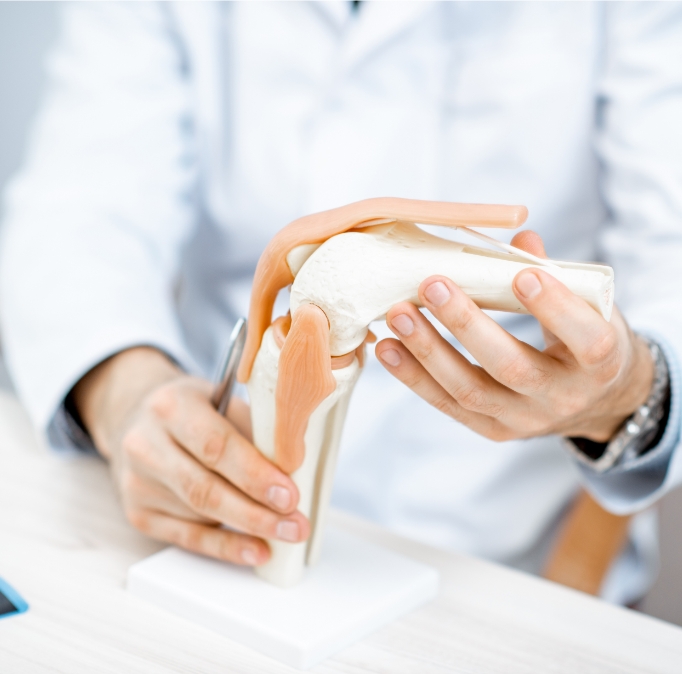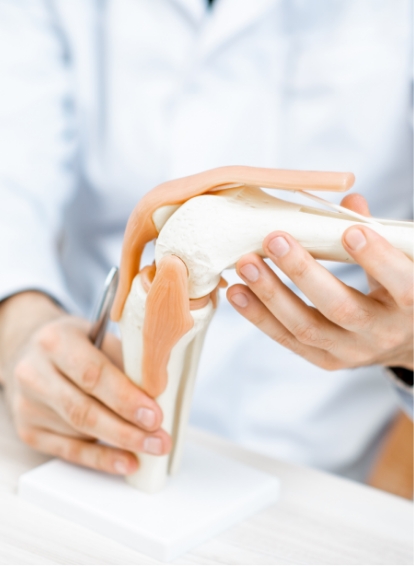Sports & Non-Surgical Orthopaedic Treatments
Neck Pain
Neck pain is a common issue that can stem from various causes, including muscle strain, poor posture, or underlying medical conditions. It can range from mild discomfort to severe pain that affects movement and daily activities. Neck pain often radiates to the shoulders or upper back and may be accompanied by stiffness, headaches, or tingling in the arms.
At The Clinica, our specialists in Sports & Non-Surgical Orthopaedics offer targeted treatments to manage neck pain, helping patients find relief, improve posture, and restore neck mobility for a better quality of life.

What is it?
Neck pain is discomfort or pain located in the cervical spine area, which consists of bones, muscles, nerves, and other tissues that support and move the head. The neck is particularly vulnerable to stress and strain due to its flexibility and range of motion, making it prone to injuries and degenerative conditions. Neck pain can develop gradually over time or arise suddenly due to an injury.
Common symptoms include soreness, stiffness, and restricted movement, which may make it difficult to perform everyday tasks. In some cases, neck pain may radiate into the shoulders or arms, causing numbness, tingling, or weakness. This can indicate nerve involvement, which requires prompt medical attention to prevent further complications. Neck pain can be acute, lasting a few days or weeks, or chronic if it persists for months.
While neck pain can result from minor issues like poor posture or muscle strain, it may also indicate more severe conditions, such as a herniated disc, cervical arthritis, or spinal stenosis. Identifying the cause of neck pain is crucial for effective treatment and preventing long-term issues.
Book an appointment
Additional Information

Causes of the condition
The causes of neck pain vary and often include muscle strain, poor posture, and degenerative conditions. Sitting or standing with improper posture for extended periods places strain on the neck muscles, leading to discomfort and stiffness. Activities that require prolonged screen time, such as working on a computer or using a mobile device, can contribute to “text neck,” a type of neck pain caused by looking down for extended periods.
Injuries, such as whiplash from car accidents, are another common cause of neck pain. Whiplash occurs when the head moves rapidly back and forth, straining the neck muscles and ligaments. Age-related degeneration, including conditions like cervical arthritis or herniated discs, can also lead to chronic neck pain. As the cervical discs lose flexibility, they become prone to wear and tear, resulting in pain and reduced mobility.
Less common causes of neck pain include infections, inflammatory conditions, and even certain types of cancer. Identifying the underlying cause is essential for effective treatment and lasting relief.
Tests that can be done to confirm the condition
Diagnosing neck pain involves a physical examination and an assessment of the patient's medical history and lifestyle factors. The clinician may examine the neck for areas of tenderness, swelling, and range of motion. Observing how the patient moves can also provide insights into possible sources of pain and underlying structural issues.
Imaging tests, such as X-rays, MRI, or CT scans, are often used to identify the cause of neck pain. X-rays provide a view of the cervical spine’s bone structure, helping to detect issues like bone spurs, fractures, or arthritis. MRI is useful for assessing soft tissue structures, such as muscles, ligaments, and intervertebral discs, and can help identify conditions like herniated discs or nerve compression.
In some cases, electromyography (EMG) may be recommended to assess nerve function and detect any nerve damage contributing to neck pain. Blood tests may also be conducted to rule out infections or inflammatory conditions if these are suspected.
Effective treatments
Treatment for neck pain focuses on relieving discomfort, reducing inflammation, and restoring flexibility and strength to the neck muscles. Initial treatment often involves rest, ice or heat application, and over-the-counter pain relievers to alleviate mild pain and stiffness. Adjusting lifestyle habits, such as improving posture and taking breaks during screen time, is also important for recovery.
Physical therapy is highly effective for managing neck pain, focusing on exercises to strengthen the neck and shoulder muscles, improve flexibility, and relieve muscle tension. Stretching exercises can help alleviate tightness, while strength-building routines provide better support for the cervical spine. In cases where posture is a contributing factor, ergonomic adjustments may be recommended to minimise strain.
Non-surgical options, such as corticosteroid injections or trigger point injections, may be used to manage persistent pain and inflammation. For chronic conditions, advanced treatments like radiofrequency ablation, which uses heat to disrupt pain signals, may provide longer-lasting relief. Surgery is considered a last resort for severe cases, such as herniated discs or spinal stenosis, that do not respond to conservative treatments.
Book an appointment for the initial consultation
Booking an initial consultation at The Clinica is the first step toward identifying and managing neck pain effectively. During this session, our specialist will perform a comprehensive assessment, discuss your symptoms, and review your medical history to determine possible causes. A thorough physical examination of the neck and surrounding areas will help pinpoint the exact source of discomfort.
If necessary, imaging or diagnostic tests will be arranged to confirm the diagnosis and guide treatment. Following the evaluation, a personalised treatment plan will be developed, focusing on pain relief, rehabilitation, and strategies to prevent recurrence, ensuring a structured approach to recovery.
Frequently Asked questions
Recovery time depends on the cause and severity of the pain. Mild cases may resolve within days, while chronic or severe neck pain may require weeks or months of treatment.
Yes, most cases of neck pain improve with non-surgical treatments like physical therapy, lifestyle modifications, and pain management techniques. Surgery is usually a last resort.
Corticosteroid injections can provide temporary relief for neck pain caused by inflammation, especially in cases of nerve irritation or arthritis. They are generally used as part of a broader treatment plan.
Gentle stretching and strengthening exercises targeting the neck and shoulder muscles can help relieve neck pain and improve flexibility. A physical therapist can guide you with specific exercises.
It depends on the severity of your pain and the nature of your job. Your specialist can advise on modifications to minimise strain and promote healing.
Specialised Clinics
General Enquiries
Please send your enquiry to us and our Practice Manager will be in touch shortly. Alternatively, if you would rather speak to us or your enquiry requires our urgent attention, please call us on 01344 946363.









